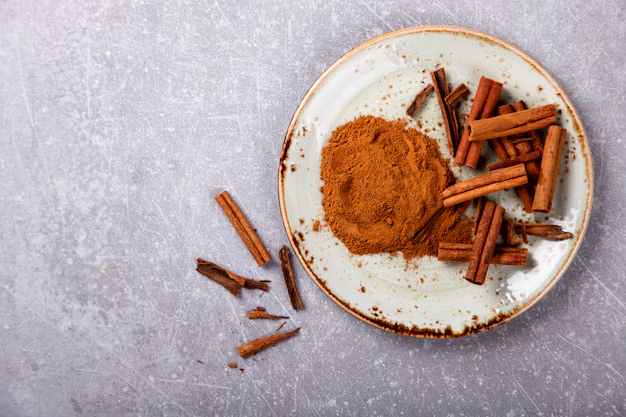Your Guide to Is Cinnamon Good For Hypertension
What You Get:
Free Guide
Free, helpful information about HyperTension FAQ and related Is Cinnamon Good For Hypertension topics.
Helpful Information
Get clear and easy-to-understand details about Is Cinnamon Good For Hypertension topics and resources.
Personalized Offers
Answer a few optional questions to receive offers or information related to HyperTension FAQ. The survey is optional and not required to access your free guide.
Can Cinnamon Help Manage High Blood Pressure?
Cinnamon, a beloved spice known for its warm flavor and aromatic appeal, has long been a staple in kitchens worldwide. Recently, it has been gaining attention for its potential health benefits, particularly its impact on hypertension or high blood pressure. But what does science say about the connection between cinnamon and hypertension?
The Science Behind Cinnamon and Hypertension
Cinnamon has several compounds, notably cinnamaldehyde and cinnamic acid, which may contribute to its health-promoting effects. Some research suggests that cinnamon can help improve blood circulation and enhance insulin sensitivity, which might indirectly affect blood pressure levels. A small number of clinical studies have explored this connection, observing a modest reduction in blood pressure among those who consumed cinnamon regularly.
For example, a review of clinical trials suggested that consuming cinnamon might lead to slight improvements in both systolic and diastolic blood pressure. However, these effects are generally observed with consistent cinnamon intake over a period of weeks or months and alongside a healthy lifestyle. Thus, while cinnamon can be part of a heart-healthy diet, it should not be relied upon as a standalone treatment for hypertension.
Adding Cinnamon to Your Diet
Incorporating cinnamon into your diet is easy and delicious. Here are a few simple tips:
- Sprinkle cinnamon on oatmeal or yogurt for a flavorful breakfast.
- Add a dash of cinnamon to coffee or tea for a warm, spicy twist.
- Use cinnamon in baking, from cookies to bread, to enhance sweetness without extra sugar.
- Mix cinnamon into smoothies for added depth and aroma.
While cinnamon is a versatile and delicious addition to various dishes, it’s crucial to remember that portion control is important. High doses of certain types of cinnamon, like cassia cinnamon, could lead to liver damage due to the presence of coumarin, a potentially harmful compound.
Lifestyle and Dietary Considerations
Cinnamon's potential blood pressure benefits will have the most significant impact when combined with a comprehensive lifestyle approach:
- Maintain a balanced diet: Focus on whole foods rich in fruits, vegetables, lean proteins, and whole grains.
- Limit salt intake: Reducing sodium in your diet can have a significant impact on blood pressure levels.
- Stay physically active: Regular exercise can lower blood pressure and strengthen your heart.
- Manage stress: Practices such as meditation, yoga, and deep breathing can help reduce stress and improve cardiovascular health.
Exploring Financial and Educational Support
While maintaining a health-focused lifestyle can be challenging, various financial aids and educational programs can offer support. Whether by providing resources for healthier food choices or educating the public about hypertension management, these tools can empower individuals to live healthier lives. Here are some options worth exploring:
- Government assistance programs: These often provide funds or access to healthier food options for low-income families.
- Nonprofit organizations: Many offer free workshops and seminars on managing hypertension and maintaining a healthy diet.
- Educational grants and scholarships: These can relieve financial burdens, allowing individuals to focus on their health and education.
- Healthcare financial assistance: Programs that help cover the cost of medical checkups or prescription medications.
Financial and Educational Support Programs🌟
- 🏛️ Government Food Assistance: Provides food benefits to low-income individuals and families.
- 🎓 Scholarships & Grants: Aid students in completing their education while managing health conditions.
- 🏥 Healthcare Assistance Programs: Help lower healthcare costs for those without insurance.
- 📚 Community Education Events: Free classes focused on diet, health, and hypertension management.
- 🏡 Debt Relief Options: Helps manage financial stress, indirectly benefiting overall health stability.
Making informed lifestyle choices, like incorporating beneficial foods such as cinnamon, can have positive effects on blood pressure. By coupling these choices with available financial and educational resources, individuals can better manage their health and financial goals.
What You Get:
Free HyperTension FAQ Guide
Free, helpful information about Is Cinnamon Good For Hypertension and related resources.

Helpful Information
Get clear, easy-to-understand details about Is Cinnamon Good For Hypertension topics.

Optional Personalized Offers
Answer a few optional questions to see offers or information related to HyperTension FAQ. Participation is not required to get your free guide.


Discover More
- a 66 Year Old Female With a History Of Hypertension
- Are Eggs Bad For Hypertension
- Are Eggs Good For Hypertension
- Are Endocrine Disorders Causing Hypertension Rare
- Can Adderall Cause Hypertension
- Can Alcohol Cause Hypertension
- Can Allergies Cause Hypertension
- Can Anemci People Get Hypertension
- Can Anemia Cause Hypertension
- Can Antibiotics Cause Hypertension
